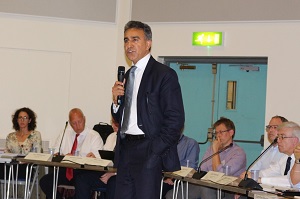Residents Prepare For Legal Action Over Southall Pollution
Locals say they have suffered health issues from development at former gas works

Angela Fonso with daughters Emma and Karen
|
Residents who claim to have suffered health problems from headaches to cancers from the development of the old Southall Gasworks site are gearing up to take the developer and Ealing Council to court.
Community group Clean Air for Southall and Hayes (CASH) are about to launch a crowd-funding campaign to help with legal bills, after what they describe as years living with petrol-like odours, respiratory problems, and other illnesses.
Meanwhile the Ealing Southall Constituency Labour Party has pledged £250 to help with legal costs, voting 35-2 in favour of an emergency motion highlighting the lack of off-site air quality monitoring stations or studies investigating links between reported illnesses and the Waterside development.
Southall CLP slammed the local authority’s recent efforts to engage residents, saying: “The meeting organised by the council on the 10th July 2019 was shambolic and only intended to filibuster.”
The motion also called for the council to consider bringing an action under statutory nuisance, which they said required no harm to health to be proved.
Responding to the motion, Ealing Council leader Julian Bell said the majority of the work to decontaminate the gasworks was finished, the on-site soil hospital had closed, and data showed contamination was falling.
Bell said the development was approved in 2010 by then-mayor Boris Johnson after being rejected by the council.
“When Ealing Labour won control of the council later that year, we took advice about the possibility of challenging that decision, but there were no realistic legal avenues to overturn Boris Johnson’s approval.”
Bell said the council had received “continuous assurances” from the Environment Agency that it is satisfied by the action that has been taken, including the legal requirement for the developer to put in place independent air quality monitoring.
“The council has considered statutory nuisance action. However, there would be little realistic chance of success because the Environment Agency has confirmed that the measures taken are over and above what is required.”

Backing CASH’s legal action is barrister and QC Jo Sidhu, who said the Environment Agency and Public Health England would also likely find themselves defending their conduct.
Mr Sidhu, who specialises in criminal law, said “a team of high-powered environmental lawyers” would also be enlisted in helping residents.
The initial appeal will be for £25,000, but Mr Sidhu said this may increase as time went on.
The legal challenges will likely come under three aspects, according to Mr Sidhu.
These included environmental law breaches that may have been committed by Public Health England, developer the Berkeley Group, and the Environment Agency.
Mr Sidhu also said the statutory oversight role of Ealing Council would be looked at, to see if the local authority had failed in its responsibility to protect residents.
There would also likely be challenges centred around the developer causing public and private nuisance, based upon the persisting odour residents describe from the site and the effect of chemicals carried in the air.
The third element would be residents seeking compensation for harm caused, with some blaming the development for headaches, respiratory problems, dizziness and even cancer.
Mr Sidhu said: “A matter such as this will inevitably end up in High Court.
“We will be seeking to collect evidence of our own through independent agencies.”
This independent evidence would include air quality testing and medical evidence from those reported to be suffering.
A spokesman for developer the Berkeley Group said: “Berkeley has completed its soil remediation works, which were undertaken in accordance with the applicable regulatory requirements.
“All work has been closely monitored and approved by the authorities, including the London Borough of Ealing and the Environment Agency. Any legal challenge will be vigorously opposed.”
Public Health England’s third and most recent Interim Health Risk Assessment of the development, which was released July 9 – the night before the first public meeting held to discuss health concerns – is based solely upon data from Atkins – a consultancy employed by the developer.
The Public Health England reporter notes several limitations in the air quality monitoring, including that “detailed monitoring data had only been provided for a 47 week period” and “laboratory analysis was not consistently undertaken at all monitoring locations during this period (i.e. 47 week monitoring data is not available for all locations).”
The interim report also notes: “PHE have not been presented with full details on past land use for the site which would indicate the likely chemicals present on site and inform the conceptual site model.
“As such, PHE are unable to comment on the appropriateness of the air quality sampling undertaken; however, note that the VOC and SVOC tested are broadly consistent with the chemicals identified elsewhere on former gas works.”
Atkins stuck by their monitoring, saying: “Our review of the remediation contractor’s air quality monitoring data – as well as the raw data itself – has been scrutinised by the London Borough of Ealing, Environment Agency and Public Health England who have considered it appropriate information upon which to make key judgements on the potential risk to public health.”
In response to questions about the planned legal challenge Dr Yimmy Chow, from Public Health England’s North West London Health Protection Team, said: “We have met with local people about the Southall Waterside development and listened to their concerns about health.
“Our role with Ealing Council and the Environment Agency has been to assist them to meet their legal obligation to identify and remove unacceptable risks to public health.
“The council asked us to review the air quality data for the site and the results show that there is unlikely to be a risk to the long-term health of the nearby population from the chemicals detected.
“We are continuing to work with Ealing Council, the Environment Agency and the community to provide public health advice and support.”
The Environment Agency declined to comment, saying: “we are unable to comment on any potential or ongoing legal cases.”
A council spokesman said the authority had every sympathy for the residents who have experienced odours in the area.
He said: “Treating contaminated land is a highly regulated activity.
“We have received continuous assurances from the Environment Agency, that it is satisfied that proper mitigations are in place including a legal requirement for the developer to put in place independent monitoring of air quality, to ensure it is within the terms of the licence set by the regulator.
“We have also sought independent advice from Public Health England and asked it to review data collected at the site and to confirm any possible health impacts.
“Three reports have now been published, which have found that while smells are unpleasant they are unlikely to pose a risk to the health of the nearby population.
“The council is encouraging anyone who is experiencing any problems to report them to us on 020 8825 8111.”
PHE’s Health Risk Assessment notes that the likes of benzene, trichloroethylene and 4-isopropyltoluene were intermittently above recommended levels whilst naphthalene levels were regularly above the guideline values.
Benzene and naphthalene are known carcinogens, meaning they have been found to heighten the risk of cancer in humans.
However, the Risk Assessment notes that the exceedances of benzene, trichloroethylene and 4-isopropyltoluene had been for shorter periods and would not automatically result in an increased risk to health.
The detection of naphthalene at levels above World Health Organisation guidelines did not indicate an immediate risk to health either, PHE reported, as the guidelines were set to be protective of exposures over a lifetime.
Therefore exceedances for part of the lifetime would not automatically result in an increased risk.
Not everyone is behind CASH’s legal challenge.
Southall Community Habitat (SCH), who refused to provide details of their membership base, believes it will take too long and be too costly.
SCH spokesman Inderjeet Singh said he would prefer to see an epidemiology study conducted by Public Health England to link illnesses to works.
But Mr Sidhu said it was only the threat of legal action that made the issue a national story.
He said: “It’s fundamental to obtain the evidence we need to prove Berkeley have caused harm to the people in the community.”
CASH coordinator Angela Fonso said the legal action would be taken after multiple complaints from residents over 2 and a half years.
She said: “Legal action is essential to protect the health of the community and to allow residents to enjoy their homes and environment, without experiencing an odour nuisance which is affecting health and lifestyle.”
Mrs Fonso and her two daughters live about a third of a mile from the site’s Brent Road entrance, and that she had suffered headaches, nausea, persistent coughing, eye irritation and mental confusion and one of her daughters has been prescribed an inhaler since the works began.
Mrs Fonso said the Crowd Justice page for making contributions to the legal challenge would be up and running in the coming days.
Ged Cann Local Democracy Reporter
30 July 2019